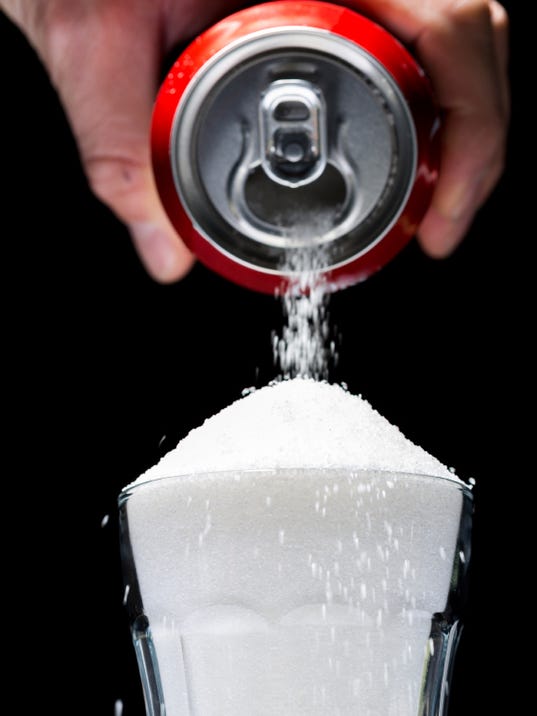 Although most people still believe that eating saturated fats and cholesterol is the greatest risk factor in developing heart disease, the real threat comes from refined sugars in the diet. A new study finds that even teenagers who consume too many added sugars in soft drinks and foods develop high cholesterol and may have higher risk of heart disease as adults.
Although most people still believe that eating saturated fats and cholesterol is the greatest risk factor in developing heart disease, the real threat comes from refined sugars in the diet. A new study finds that even teenagers who consume too many added sugars in soft drinks and foods develop high cholesterol and may have higher risk of heart disease as adults.
The research, published in Circulation: Journal of the American Heart Association, followed 2,157 teenagers aged 12 to 18 as part of the National Health and Nutrition Survey (NHANES). The teenagers were consuming an average of 119 grams of added sugar daily which equates to over 28 teaspoons or 476 calories, and represented over 21 percent of their diet.
Researchers found that teens consuming the most added sugars (more than 30 percent of total calories) had lower levels of high density lipoprotein (HDL), the good cholesterol, and higher levels of both triglycerides and low density lipoproteins (LDL), the bad cholesterol.
"Added sugars" were defined by the researchers as any caloric sweeteners added to foods or beverages by the manufacturer during processing or by the consumer. According to the researchers, previous studies have indicated that the largest contributors of added sugars to the diet are sugary beverages such as sodas, fruit drinks, coffees and teas.
Teenagers with the highest levels of added sugar had good HDL cholesterol levels that were nine percent lower than those with the lowest sugar consumption. Their bad LDL levels were also nine percent higher. In addition, triglyceride levels of the highest users were 10 percent higher than those using the least amount of added sugars. Finally, overweight or obese adolescents with the highest levels of added sugar consumption showed increased signs of insulin resistance.
The researchers expressed the concern that with long-term exposure, the unfavorable cholesterol profiles of these adolescents would place them at risk for heart disease later in adulthood. Previous research had only focused on adults.
In 2009, the American Heart Association issued a new scientific statement recommending that women limit their intake of added sugars to 100 calories per day and that men limit their daily intake to 150 calories. That equates to a maximum of 6 to 9 teaspoons daily, at 16 calories per teaspoon.
Unfortunately, food labels don't let you know how many teaspoons of sugar you're eating. First of all, they measure everything in grams rather than teaspoons. Secondly, they don't tell you how many sugar grams are added to the product versus how many are naturally occurring as, for example, lactose in dairy products and fructose in products containing fruit. That problem won't be solved until the government changes food labeling laws to require specific disclosure of added sugars.
Each 4 grams of sugar on the label is one teaspoon, or 16 calories. So your maximum 6 to 9 teaspoons will be equivalent to 24 to 36 grams on a food label.
The researchers recommended that both adolescents and adults should use the nutrition labels on drinks and food to become familiar with the amount of sugar in them, and to replace sugar laden drinks with water to substantially reduce sugar and calories.
Resources:
Wrist Watch for Men
ResponderEliminarBest Watch brands in USA
Watch Brands in USA
Wrist Watch for kids
Wrist watch for girls
Watch winders in USA
Natural Treatment for Actinic Keratosis is to prevent the lesions from turning into skin cancers. Herbal Supplement used to treat or reduce the symptoms.
ResponderEliminarIt is very important and best recommended to ensure that you look out for effective cure options because only that does support bettering the disorder in a record time. To help you relieve burning mouth syndrome, we are going to list out the best Natural Remedies for Burning Mouth Syndrome. Honey is Herbal Supplement for Burning Mouth Syndrome natural antiseptic and has been shown to be actual in curing several types of wounds.
ResponderEliminarApproved Auditor in DAFZA
ResponderEliminarApproved Auditor in RAKEZ
Approved Auditor in JAFZA
i heard about this blog & get actually whatever i was finding. Nice post love to read this blog
Approved Auditor in DMCC